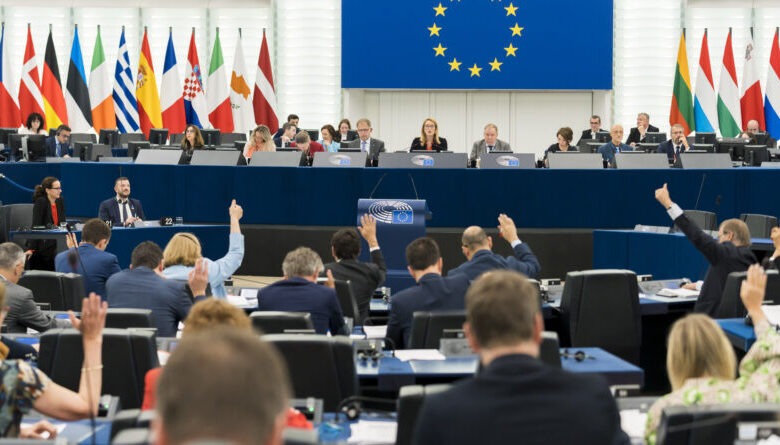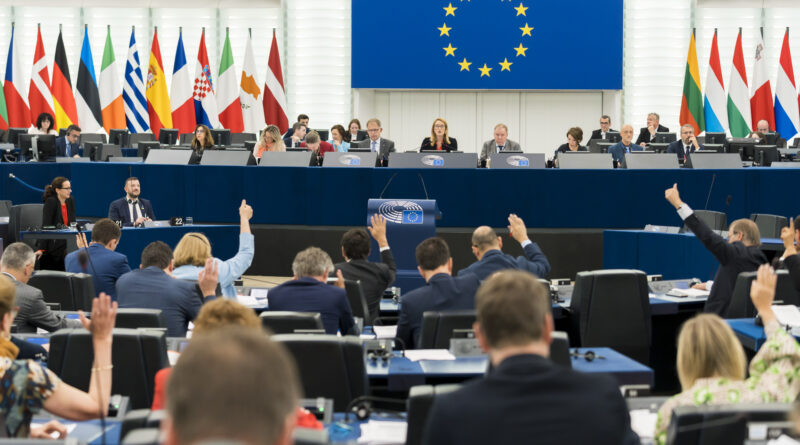
European Parliament Elections Could Usher In More Climate Skeptics, Expert Says
European Parliament elections could usher in more climate sceptic majority expert says, a prospect that has many environmental advocates worried. As Europe grapples with the urgent need to address climate change, the political landscape is becoming increasingly polarized. This polarization is evident in the rise of climate skepticism, a phenomenon that has gained traction in recent years, particularly among certain segments of the European population.
This skepticism, fueled by misinformation and a lack of trust in scientific consensus, poses a significant challenge to the EU’s efforts to implement effective climate policies.
The upcoming European Parliament elections are seen as a pivotal moment in this ongoing debate. The outcome of these elections will have a profound impact on the EU’s future climate agenda. If climate skeptics gain a majority in the Parliament, it could significantly hinder the EU’s ability to enact ambitious climate change legislation and effectively implement existing policies.
This could have far-reaching consequences, not only for Europe but also for global efforts to mitigate climate change.
The Current Climate of European Politics

The political landscape of Europe is undergoing a significant shift, with climate skepticism gaining traction across the continent. This trend is particularly pronounced in the context of the upcoming European Parliament elections, where climate skepticism is emerging as a key issue for voters.
The Rise of Climate Skepticism in European Politics
Climate skepticism, the rejection or doubt of the scientific consensus on climate change, has been a growing phenomenon in Europe. This skepticism has manifested itself in the emergence of political parties and movements that actively challenge the scientific consensus on climate change and oppose policies aimed at addressing it.
Examples of Climate Skeptical Parties and Movements
Several political parties and movements in Europe have gained traction by capitalizing on climate skepticism. For instance, the Alternative for Germany (AfD), a right-wing populist party, has made climate change denial a central part of its platform. Similarly, the National Rally (formerly the National Front) in France has expressed skepticism towards the scientific consensus on climate change and has opposed policies aimed at reducing carbon emissions.
The upcoming European Parliament elections are a cause for concern, with experts warning of a potential rise in climate sceptic voices. While the political landscape shifts, the world of sports continues on, with France set to face off against Italy and Belgium in the Nations League.
france to play italy and belgium in nations league This exciting competition offers a welcome distraction from the serious issues facing the European Union, but it remains to be seen whether the election results will ultimately impact the fight against climate change.
Key Arguments Used by Climate Skeptics
Climate skeptics in Europe often employ a range of arguments to challenge the scientific consensus on climate change. These arguments include:
- Challenging the scientific consensus:Some climate skeptics argue that the scientific consensus on climate change is not as strong as scientists claim, highlighting dissenting voices and emphasizing uncertainties in climate models.
- Economic concerns:Climate skeptics often argue that policies aimed at mitigating climate change will have negative economic consequences, such as job losses and increased energy costs.
- Focus on natural climate variability:Some climate skeptics argue that the current warming trend is part of natural climate cycles and is not primarily caused by human activities.
- Conspiracy theories:A small but vocal segment of climate skeptics promotes conspiracy theories, claiming that climate change is a hoax or a ploy by governments or corporations to control the population.
Resonance of Climate Skepticism, European parliament elections could usher in more climate sceptic majority expert says
Climate skepticism resonates with certain segments of the European population for a variety of reasons. These include:
- Economic anxieties:In times of economic hardship, people may be more receptive to arguments that suggest climate action will lead to economic hardship. This is particularly true in regions that rely heavily on industries that are seen as contributors to climate change.
- Mistrust of authority:Some individuals may be distrustful of scientific institutions and government agencies, viewing climate change as a manufactured crisis. This distrust can be fueled by political rhetoric that demonizes scientific experts and government policies.
- Cultural and ideological factors:Climate skepticism can be linked to broader cultural and ideological beliefs, such as individualism, libertarianism, and a distrust of government intervention. Individuals who hold these beliefs may be more likely to reject the need for government action to address climate change.
The European Parliament Elections and Climate Change
The upcoming European Parliament elections hold significant implications for the future of climate change policy in the European Union. The results of these elections will determine the composition of the European Parliament, which in turn will influence the EU’s stance on climate change and its ability to implement ambitious policies to address this pressing issue.
The European Parliament elections are looming, and experts warn that a climate-sceptic majority could emerge. This is a chilling prospect, especially considering the dire warnings from scientists about the climate crisis. It’s a reminder of how easily we can lose sight of the post-WWII norms that have governed our relationships, as outlined in this article loser is humanity we re losing sight of norms post wwii which govern whole human relationships.
If we continue down this path of denial and inaction, the consequences for our planet and future generations will be devastating. It’s crucial that we elect leaders who prioritize environmental protection and work collaboratively to address this global challenge.
Potential Impact of the Elections on Climate Change Policy
The European Parliament plays a crucial role in shaping the EU’s climate change policy. It co-legislates with the Council of the European Union on all major EU legislation, including those related to climate change. The Parliament also has a significant role in scrutinizing the European Commission’s proposals and actions on climate change.
The outcome of the elections could have a significant impact on the EU’s climate change policy in several ways:
- The composition of the European Parliament:The composition of the European Parliament will determine the balance of power between political groups with different positions on climate change. A majority of MEPs committed to ambitious climate action will be crucial for advancing the EU’s climate goals.
- The EU’s negotiating position:The European Parliament’s position on climate change will influence the EU’s negotiating position in international climate negotiations, such as those under the United Nations Framework Convention on Climate Change (UNFCCC).
- The level of ambition in EU climate policy:The European Parliament’s influence on the EU’s climate policy will determine the level of ambition in the EU’s climate targets and policies. A more climate-ambitious Parliament will push for stronger targets and policies, while a less ambitious Parliament may lead to weaker commitments.
Scenarios for the Composition of the European Parliament
Several scenarios are possible for the composition of the European Parliament in terms of climate change positions. These scenarios are influenced by factors such as the political climate in each member state, the performance of different political parties, and the level of public support for climate action.
It’s concerning to hear that the upcoming European Parliament elections could lead to a more climate-sceptic majority, as this could have dire consequences for global climate action. The situation is further complicated by the growing pressure on natural habitats, as illustrated by the recent report on India’s tigers climbing higher as climate and human pressures rise.
This highlights the interconnectedness of environmental issues and the need for decisive action, which makes the potential for a climate-sceptic majority in the European Parliament even more alarming.
- A climate-ambitious Parliament:In this scenario, a majority of MEPs are committed to ambitious climate action. This would likely result in the EU adopting more ambitious climate targets and policies. This scenario is more likely if there is a strong public mandate for climate action in several key member states.
- A mixed Parliament:In this scenario, the European Parliament is divided between MEPs who support ambitious climate action and those who are more hesitant. This could lead to a more fragmented approach to climate policy, with compromises and delays in implementing key measures.
This scenario is more likely if there is a lack of public support for climate action in some member states.
- A climate-sceptic Parliament:In this scenario, a majority of MEPs are sceptical of the need for ambitious climate action. This could lead to the EU adopting weaker climate targets and policies, or even a rollback of existing policies. This scenario is less likely but could occur if there is a significant shift in public opinion towards climate scepticism in several key member states.
Positions of Different Political Groups on Climate Change Policy
Different political groups in the European Parliament have varying positions on climate change policy.
- Green parties:Green parties are generally the most supportive of ambitious climate action. They advocate for a rapid transition to a low-carbon economy and are critical of the EU’s current climate policies.
- Socialist and Democratic parties:Socialist and Democratic parties are generally supportive of climate action but may have some differences in their approaches. Some parties are more focused on social justice and environmental protection, while others prioritize economic growth and competitiveness.
- Liberal parties:Liberal parties are generally supportive of climate action but may have a more pragmatic approach. They often emphasize the importance of market-based solutions and innovation in addressing climate change.
- Conservative parties:Conservative parties are generally less supportive of ambitious climate action. They often prioritize economic growth and may be sceptical of the need for significant government intervention in the economy.
- Populist parties:Populist parties are generally opposed to climate action. They often deny the scientific consensus on climate change or argue that climate action is too costly or disruptive.
The Impact of a Climate Skeptic Majority: European Parliament Elections Could Usher In More Climate Sceptic Majority Expert Says
The prospect of a climate skeptic majority in the European Parliament raises significant concerns about the EU’s ability to effectively address the climate crisis. Such a scenario could lead to a rollback of existing climate policies, a weakening of international climate commitments, and a detrimental impact on the EU’s green transition.
Impact on EU Climate Change Legislation and Policy Implementation
A climate skeptic majority in the European Parliament could significantly hinder the implementation and advancement of EU climate change legislation. The Parliament plays a crucial role in shaping and approving EU legislation, including climate-related policies. A majority of climate skeptics could:
- Delay or block the adoption of new ambitious climate legislation, such as stricter emissions targets or regulations for industries.
- Weaken existing climate policies by proposing amendments that reduce their effectiveness.
- Cut funding for climate-related projects and initiatives, impacting the EU’s ability to invest in green technologies and sustainable solutions.
For example, the European Green Deal, a comprehensive plan for achieving climate neutrality by 2050, could face significant obstacles with a climate skeptic majority. The Green Deal includes ambitious targets for reducing emissions, promoting renewable energy, and supporting sustainable agriculture.
These targets could be challenged or watered down by a majority opposed to climate action.
Implications for International Climate Agreements and Negotiations
The EU’s stance on climate change significantly influences global climate negotiations. A climate skeptic majority in the European Parliament could weaken the EU’s commitment to international climate agreements and undermine its role as a leader in global climate action. This could lead to:
- Reduced ambition in EU climate targets, potentially undermining the Paris Agreement’s goals.
- Less support for developing countries in their efforts to adapt to climate change and transition to low-carbon economies.
- A less assertive EU stance in international climate negotiations, weakening its ability to push for ambitious global climate action.
A climate skeptic majority could also embolden other countries to take a less ambitious approach to climate action, further jeopardizing global efforts to combat climate change.
A Hypothetical Scenario
Imagine a scenario where a climate skeptic majority in the European Parliament blocks the adoption of the European Green Deal, leading to a delay in the EU’s transition to a green economy. This could result in:
- Continued reliance on fossil fuels, leading to higher emissions and a greater contribution to climate change.
- Reduced investment in renewable energy and green technologies, hindering the development of sustainable energy solutions.
- Increased vulnerability to climate impacts, as the EU fails to adapt to the changing climate.
- A decline in the EU’s global leadership on climate change, weakening its influence on international climate negotiations.
This hypothetical scenario illustrates the potential consequences of a climate skeptic majority in the European Parliament. It highlights the importance of strong political will and commitment to climate action to effectively address the climate crisis.
Final Thoughts

The European Parliament elections are a critical juncture for the future of climate action in Europe. The outcome of these elections will shape the EU’s climate policy for years to come. It is crucial for citizens to engage in informed and constructive dialogue about the challenges posed by climate change and the role of the EU in addressing them.
The stakes are high, and the choices made by voters will have a lasting impact on the planet’s future.






